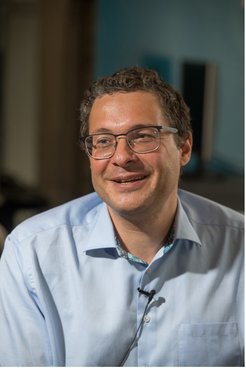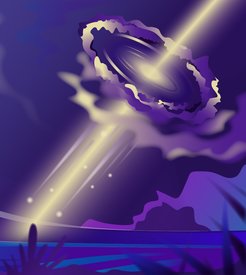
MuSES
Multi-messenger Studies of Extragalactic Super-colliders - ERC Advanced Grant
Principal Investigator: Prof. Dr. Yuri Y. Kovalev
The European Research Council (ERC) has awarded MPIfR scientist Prof. Dr. Yuri Kovalev a highly prestigious and competitive Advanced Grant of approximately 2.8 million euros under the Horizon Europe funding programme.
MuSES, which stands for Multi-messenger Studies of Energetic Sources, is a pioneering initiative in astrophysics. It is dedicated to the study of Active Galactic Nuclei (AGN), which are among the most powerful particle accelerators known in the cosmos. These celestial bodies harness the gravitational energy of matter accreted by supermassive black holes (SMBHs) and convert it into electromagnetic and kinetic energy, resulting in the production of highly relativistic electrons and protons.

The production of these particles, particularly in the vicinity of SMBHs, is the subject of intense scientific investigation, and the precise mechanisms of their production remain a major puzzle within the astrophysical community. Electrons are mainly observed in jets whose acceleration and collimation processes are not yet fully understood. The acceleration of protons and its relation to neutrino production is even less understood, posing a formidable challenge to researchers.
MuSES aims to address these fundamental questions by exploiting recent advances in multi-messenger astronomy. The detection of a high-energy neutrino signal from the blazar TXS 0506+056 by the IceCube Neutrino Observatory has opened new avenues for AGN research. The primary goal of the project is to conduct a comprehensive study of these phenomena, focusing on the key aspects of proton acceleration, jet formation and collimation, and neutrino production within AGN.
To achieve these ambitious goals, MuSES will conduct observations across the electromagnetic spectrum, with an emphasis on high-resolution very-long-baseline interferometry and analysis of data from high-energy neutrino telescopes. The knowledge gained from this research will not only improve our understanding of AGN, but will also transform these objects into well-characterised cosmic laboratories. These laboratories will be able to probe physical conditions that are currently beyond the reach of terrestrial experiments, and will contribute significantly to our knowledge of the extreme energy processes in the Universe.

From the press release issued on April 11, 2024:
“We are very fortunate to enter the golden age of multimessenger astrophysics.” says Yuri Kovalev. “High-energy neutrinos are arriving from deep space, providing information about those mysterious machines in the universe that can accelerate massive protons almost to the speed of light.” For instance, the European KM3NeT facility in the Mediterranean Sea is rapidly being developed which will double the amount of neutrino data currently collected by the American-led IceCube neutrino observatory.
“We have found early evidence that active galaxies with relativistic jets could be these cosmic super-colliders. In the project, we will study these objects with extremely high angular resolution to see directly what happens in galactic nuclei during neutrino flares.”, adds Yuri Kovalev.
The research group to be formed by Professor Kovalev in MPIfR within the advanced ERC grant will utilize the sharpest available radio images in astronomy to directly image the sources of neutrino emission. This is done using the so-called very long baseline interferometry (VLBI) technique. This is currently the best tool astronomers have for studying galaxies and sub-parsec scales at distances of billions of light years.
He concludes: “This project will allow us to understand how energy is extracted from galactic nuclei and what mechanism is responsible for the production of cosmic rays.”
Professor Anton Zensus, Director a the Max Planck Institute for Radio Astronomy, is excited about the prospects for scientific collaboration within his team: “This prestigious ERC grant to Professor Kovalev for his MuSES project, will enable him to continue his world class astronomical research on violently active central regions of galaxies in the Universe. This project will perfectly complement my M2FINDERS initiative, also funded by the ERC, and together we expect to make major progress in designing advanced methods and experiments towards better understanding of these fascinating objects in the universe, such as the center of our own galaxy, the Milky Way."
Background information: The European Research Council (ERC) has announced the names of 255 outstanding research leaders in Europe set to be awarded ERC Advanced Grants. The funding is amongst the EU’s most prestigious and competitive, providing leading senior researchers with the opportunity to pursue ambitious, curiosity-driven projects that could lead to major scientific breakthroughs. The new grants, worth in total nearly €652 million, are part of the EU’s Horizon Europe programme.

